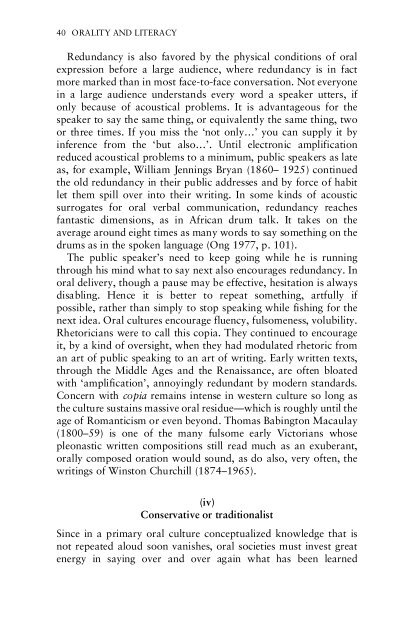Orality and Literacy: The Technologizing of the Word - Monoskop
Orality and Literacy: The Technologizing of the Word - Monoskop
Orality and Literacy: The Technologizing of the Word - Monoskop
Create successful ePaper yourself
Turn your PDF publications into a flip-book with our unique Google optimized e-Paper software.
40 ORALITY AND LITERACY<br />
Redundancy is also favored by <strong>the</strong> physical conditions <strong>of</strong> oral<br />
expression before a large audience, where redundancy is in fact<br />
more marked than in most face-to-face conversation. Not everyone<br />
in a large audience underst<strong>and</strong>s every word a speaker utters, if<br />
only because <strong>of</strong> acoustical problems. It is advantageous for <strong>the</strong><br />
speaker to say <strong>the</strong> same thing, or equivalently <strong>the</strong> same thing, two<br />
or three times. If you miss <strong>the</strong> ‘not only…’ you can supply it by<br />
inference from <strong>the</strong> ‘but also…’. Until electronic amplification<br />
reduced acoustical problems to a minimum, public speakers as late<br />
as, for example, William Jennings Bryan (1860– 1925) continued<br />
<strong>the</strong> old redundancy in <strong>the</strong>ir public addresses <strong>and</strong> by force <strong>of</strong> habit<br />
let <strong>the</strong>m spill over into <strong>the</strong>ir writing. In some kinds <strong>of</strong> acoustic<br />
surrogates for oral verbal communication, redundancy reaches<br />
fantastic dimensions, as in African drum talk. It takes on <strong>the</strong><br />
average around eight times as many words to say something on <strong>the</strong><br />
drums as in <strong>the</strong> spoken language (Ong 1977, p. 101).<br />
<strong>The</strong> public speaker’s need to keep going while he is running<br />
through his mind what to say next also encourages redundancy. In<br />
oral delivery, though a pause may be effective, hesitation is always<br />
disabling. Hence it is better to repeat something, artfully if<br />
possible, ra<strong>the</strong>r than simply to stop speaking while fishing for <strong>the</strong><br />
next idea. Oral cultures encourage fluency, fulsomeness, volubility.<br />
Rhetoricians were to call this copia. <strong>The</strong>y continued to encourage<br />
it, by a kind <strong>of</strong> oversight, when <strong>the</strong>y had modulated rhetoric from<br />
an art <strong>of</strong> public speaking to an art <strong>of</strong> writing. Early written texts,<br />
through <strong>the</strong> Middle Ages <strong>and</strong> <strong>the</strong> Renaissance, are <strong>of</strong>ten bloated<br />
with ‘amplification’, annoyingly redundant by modern st<strong>and</strong>ards.<br />
Concern with copia remains intense in western culture so long as<br />
<strong>the</strong> culture sustains massive oral residue—which is roughly until <strong>the</strong><br />
age <strong>of</strong> Romanticism or even beyond. Thomas Babington Macaulay<br />
(1800–59) is one <strong>of</strong> <strong>the</strong> many fulsome early Victorians whose<br />
pleonastic written compositions still read much as an exuberant,<br />
orally composed oration would sound, as do also, very <strong>of</strong>ten, <strong>the</strong><br />
writings <strong>of</strong> Winston Churchill (1874–1965).<br />
(iv)<br />
Conservative or traditionalist<br />
Since in a primary oral culture conceptualized knowledge that is<br />
not repeated aloud soon vanishes, oral societies must invest great<br />
energy in saying over <strong>and</strong> over again what has been learned

















